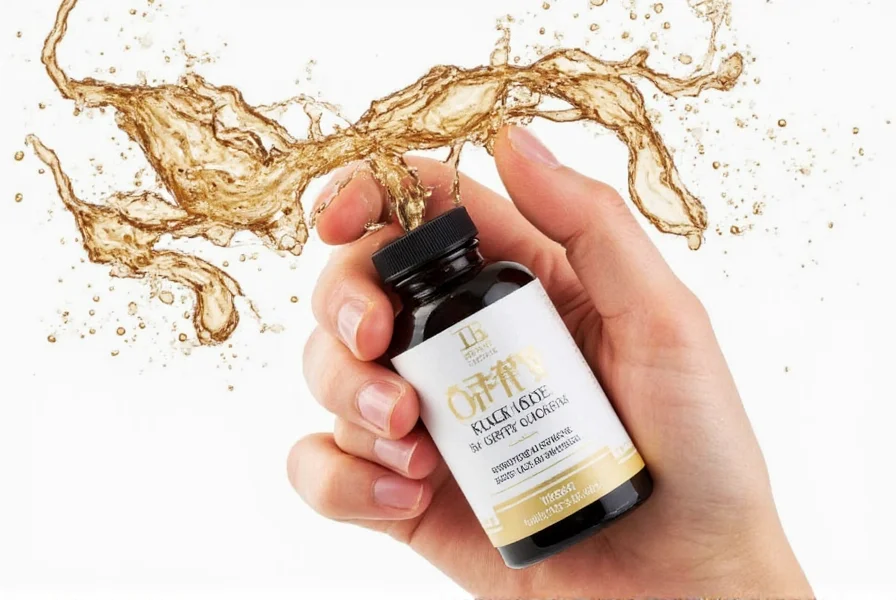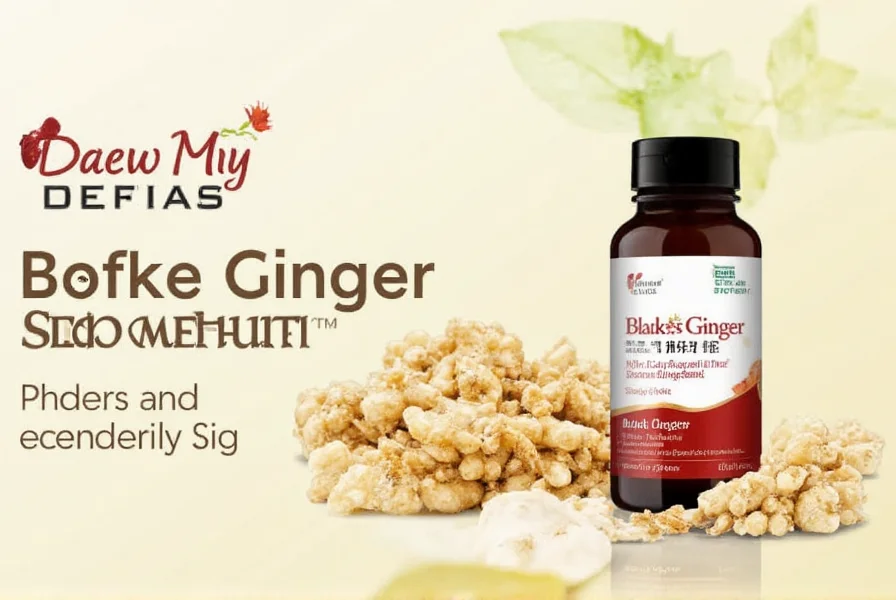Native to Southeast Asia, black ginger has been used in traditional medicine for centuries. Modern scientific interest focuses on its distinctive polyphenol profile, particularly polymethoxyflavones not found in regular ginger (Zingiber officinale). These compounds appear to contribute to black ginger extract's potential health properties while offering a different biochemical profile than its more common relative.
Understanding Black Ginger: Botanical Background
Kaempferia parviflora belongs to the Zingiberaceae family but represents a distinct botanical species from common ginger. This perennial herb grows wild in Thailand's northeastern regions and has gained attention for its dark purple rhizomes, which contain higher concentrations of certain bioactive compounds compared to regular ginger. The traditional preparation involves drying and extracting these rhizomes to create concentrated supplements.
| Characteristic | Black Ginger (Kaempferia parviflora) | Regular Ginger (Zingiber officinale) |
|---|---|---|
| Primary Bioactive Compounds | Polymethoxyflavones (5,7-DMF, 3,5,7-TMF) | Gingerols, shogaols |
| Traditional Use Regions | Thailand, Laos, Cambodia | Global, originating in Southeast Asia |
| Color of Rhizome | Dark purple to black | Pale yellow to light brown |
| Research Focus Areas | Metabolic health, antioxidant effects | Digestion, nausea, inflammation |
Chemical Composition and Unique Properties
The distinctive value of black ginger extract lies in its polymethoxyflavone content, particularly 5,7-dimethoxyflavone (5,7-DMF) and 3,5,7-trimethoxyflavone (3,5,7-TMF). These compounds demonstrate higher bioavailability than many other plant flavonoids and appear to interact with multiple biological pathways. Research suggests these compounds may influence nitric oxide production, antioxidant enzyme systems, and certain metabolic processes.
Unlike regular ginger's pungent gingerols, black ginger extract offers different sensory properties and potentially different physiological effects. This distinction makes black ginger extract for inflammation a subject of separate research from traditional ginger supplements, though both share some overlapping antioxidant properties.

Evidence-Based Health Benefits
Current scientific understanding of black ginger extract benefits comes primarily from laboratory and animal studies, with limited human clinical trials. The most promising research areas include:
Antioxidant Capacity
Multiple studies document black ginger's exceptional antioxidant activity, potentially exceeding that of regular ginger. The polymethoxyflavones appear to enhance the body's natural antioxidant defense systems, including superoxide dismutase and glutathione levels. This property forms the basis for many potential applications of black ginger extract for cellular protection.
Metabolic Health Support
Preliminary research suggests black ginger extract may support healthy metabolic function. Some studies indicate potential effects on glucose metabolism and lipid profiles, though human evidence remains limited. The compound 5,7-DMF shows particular promise in preclinical models for supporting healthy metabolic processes.
Exercise Performance and Recovery
Emerging research explores black ginger extract's potential role in physical performance. Some studies suggest it may support healthy circulation and oxygen utilization during exercise, though more rigorous human trials are needed to confirm these effects. Athletes interested in natural performance support often inquire about black ginger supplement dosage for these potential applications.
Current Research Limitations
While laboratory results are promising, significant limitations exist in our understanding of black ginger extract:
- Most human studies have small sample sizes and short durations
- Optimal black ginger extract dosage for specific benefits remains unclear
- Few long-term safety studies exist for regular consumption
- Standardization of extracts varies between products
Researchers emphasize that current evidence doesn't support specific medical claims, and black ginger should not replace conventional treatments for health conditions. The scientific community calls for more rigorous human trials to better understand its potential applications.
Safety Profile and Usage Considerations
Current evidence suggests black ginger extract is generally well-tolerated at typical usage levels. Most studies use doses ranging from 100-500mg of standardized extract daily, though optimal black ginger supplement dosage may vary based on individual factors and product concentration.
As with any supplement, certain populations should exercise caution:
- Pregnant or breastfeeding women should consult healthcare providers before use
- Individuals taking blood thinners should discuss potential interactions
- Those with gallstone issues should consult professionals before regular use
No serious adverse effects have been widely reported in research studies, but comprehensive safety data remains limited compared to more extensively studied botanicals.
Selecting Quality Black Ginger Products
When considering black ginger extract supplements, look for these quality indicators:
- Standardized extracts specifying polymethoxyflavone content (typically 20-40%)
- Third-party testing for purity and potency
- Clear labeling of botanical name (Kaempferia parviflora)
- Manufacturing according to good manufacturing practices (GMP)
Be cautious of products making exaggerated claims about black ginger extract benefits, as legitimate supplements should reflect the current state of scientific understanding with appropriate caveats.
Conclusion: A Promising Botanical with Research Ongoing
Black ginger extract represents an interesting botanical with a unique chemical profile distinct from regular ginger. While traditional use and preliminary research suggest potential health applications, consumers should maintain realistic expectations given the current evidence limitations. As scientific investigation continues, we may gain clearer understanding of appropriate black ginger extract dosage and specific applications where it offers meaningful benefits. For now, it remains a subject of legitimate scientific interest rather than a proven therapeutic agent.
What is the primary difference between black ginger extract and regular ginger?
The key difference lies in their bioactive compounds. Black ginger (Kaempferia parviflora) contains unique polymethoxyflavones like 5,7-dimethoxyflavone, while regular ginger (Zingiber officinale) primarily contains gingerols and shogaols. These different compounds lead to distinct biochemical properties and potential health applications, making black ginger extract composition fundamentally different from traditional ginger supplements.
Is there scientific evidence supporting black ginger extract benefits for inflammation?
Preclinical studies show promising anti-inflammatory effects from black ginger's polymethoxyflavones, particularly through modulation of inflammatory pathways. However, human clinical evidence remains limited. While laboratory research suggests potential mechanisms for black ginger extract for inflammation, more rigorous human trials are needed before definitive conclusions can be drawn about its effectiveness for inflammatory conditions.
What is the recommended black ginger supplement dosage?
Research studies typically use doses between 100-500mg of standardized black ginger extract daily, but no official dosage recommendations exist. The appropriate amount may depend on the extract's concentration of active compounds and individual health factors. Since optimal black ginger extract dosage hasn't been firmly established through comprehensive clinical trials, consulting with a healthcare provider before starting supplementation is advisable.
Can black ginger extract help with weight management?
Some preliminary research suggests black ginger extract may support metabolic processes related to weight management, but current evidence is insufficient to make definitive claims. While certain studies indicate potential effects on fat metabolism, these findings come primarily from laboratory and animal research. More high-quality human studies are needed before black ginger extract can be reliably recommended for weight management purposes.
How does black ginger extract compare to other natural anti-inflammatory supplements?
Black ginger extract offers a different mechanism of action compared to common anti-inflammatory supplements like turmeric or regular ginger. Its polymethoxyflavones work through distinct pathways, potentially providing complementary benefits. However, unlike turmeric which has more extensive human research, black ginger extract's anti-inflammatory effects in humans require further investigation. The unique black ginger vs regular ginger profile suggests it may offer different applications rather than being simply "better" than other options.











 浙公网安备
33010002000092号
浙公网安备
33010002000092号 浙B2-20120091-4
浙B2-20120091-4